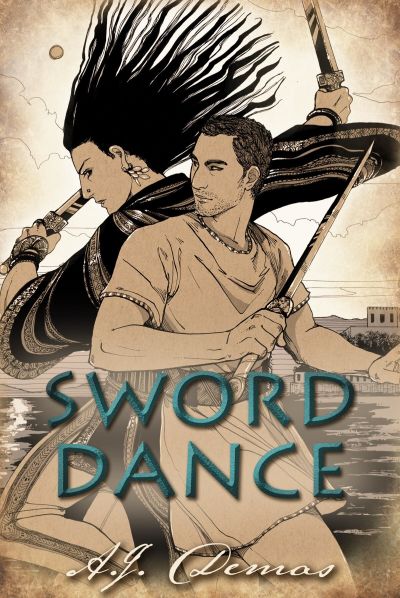Flashing Blades
Sword Dance (Sword Dance, volume 1)
By A. J. Demas

23 Mar, 2021
2019’s Sword Dance is the first volume in A. J. Demas’ Sword Dance secondary universe series.
Once a promising soldier, now reduced by injury to holding down a desk as a government functionary, Damiskos is dispatched from great Pheme, seat of empire, to the villa of an old friend, Nione Kukara. His task? To negotiate with the retired Maiden of the Sacred Loom a contract for fish sauce. Hardly the stuff of international intrigue.
So one would think.
Damiskos arrives after an onerous overland journey to discover that Nione’s household is filled with guests. Nione’s cousin, philosopher Eurydemos, is visiting, bringing with him a surprisingly large assortment of his students. Also, another guest, Aristokles Phoskos, who is supposedly eager to meet Eurydemos; he seems far more interested in courting wealthy Nione. With Aristokles comes Aristokles’ eunuch sword-dancer slave Varazda, to whom Damiskos takes an almost immediate (and mutual) dislike of the sort that never foreshadows impending romantic complications.
Eurydemos’ school of thought is obsessed with “the Ideal Republic” and “Phemian purity.” Although Pheme’s strength and status come from its huge cosmopolitan population, the philosopher and his students are convinced that foreign influences are contamination and that the only path to true glory is to somehow remove all foreign taint from the city. It’s all nonsense to Damiskos, who is not a philosopher and in any case cannot comprehend how one can make something great by removing that on which its current power depends.
The great kingdom of Zash is a Phemian ally, but the philosophers have decided that Zash is problematic, for its ways are very very different from Pheme’s. Varazda is also suspect, as Pheme does not create or employ eunuchs; the philosophers find them disturbing because they cannot be crammed into the narrow gender roles demanded by propriety.
How does Damiskos feel about eunuchs? He disapproves of the institution, given that many of men undergoing the operation do not survive, but he has nothing against the survivors. As a class, anyway. Varazda, however, is prickly and unlikable, clearly the sort of person for whom Damiskos could never fall.
Damiskos gradually learns a number of very interesting secrets.
- Aristokles is not there to court Nione (who in any case has no particular need of men for any purpose save friendship). He is on a top-secret mission to recover Zashian documents stolen during a riot staged by Eurydemos’ extremist students.
- Aristokles belongs to what we might call the James Bond school of espionage, in which keeping the other side from discovering who one is and what one is up to is not Mission One if it gets in the way of impressing people with one’s job as a spy.
- Aristokles mysteriously vanishes in the manner of a spy whose enemies know who he is.
Luckily for the forces of order, Aristokles was but a front for the real government agent, Varazda, who is no slave at all. Varazda drafts Damiskos into his mission, on the pretext that before Aristokles left, he sold Varazda to Damiskos, who has of course been overcome by Varazda’s charms. This is all lies and yet not entirely untrue.
It may also be too late, as the extremists decide to the time has come for open action….
~oOo~
I for one am pleased to see the James Bond habit of impressing people by handing out metaphorical business cards on the flimsiest of pretexts is only reasonable when one has plot immunity. If one is not the lead, try more subtle methods.
Hands up, everyone who is surprised that Varazda and Damiskos fall for each other despite their immediate antagonism. Let’s not always see the same hands. I suppose in any potential pairing, either the people will eventually fall for each other or they won’t. Call it 50/50 odds? Although it seems like these sort of pairs fall for each other more often than that.
Note how I didn’t say “secondary universe fantasy series.” While it is clear that this is not set in our own past, thus far there is not much evidence of actual magic … although no doubt there are people in that world who believe in it. This is another example of something for which I really need to coin a nice phrase, a mundane secondary universe. (I should add that the tech in the novel is appropriate for classical Greece, not our modern world. See Wings of Honneamise for a mundane secondary universe that features remnants of modern tech).
Also: it is unfortunate but true that many of the ancient Greeks were judgemental xenophobes, as are some of the characters in the novel.
The main plot (espionage carried out despite Aristokles’ stumbling efforts to inadvertently sabotage the op, evolving into the effort to defend some fishing huts from potentially homicidal philosophy students) seemed like something one might encounter in a Bujold story. Along those lines, the rapidly evolving plans of the students also seem Bujoldian (as in The Vor Game’s antagonist Cavilo1). That is praise, because I like Bujold stories.
Sword Dance is available here (Amazon US), here (Amazon Canada), here (Amazon UK), here (Barnes & Noble), here (Book Depository), and here (Chapters-Indigo).
1: To quote
“You should have stuck to your original contract. Or your second plan. Or your third. You should, in fact, have stuck to something. Anything. Your total self-interest didn’t make you strong, it made you a rag in the wind, anybody’s to pick up.
